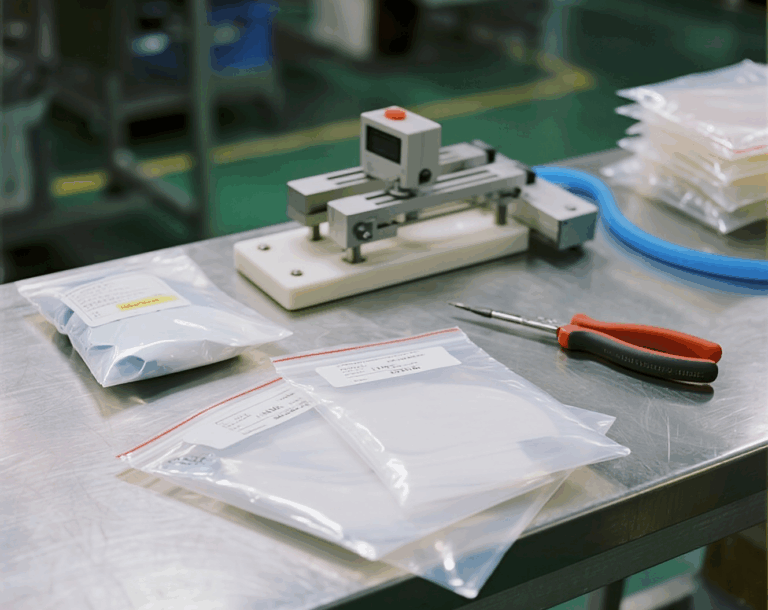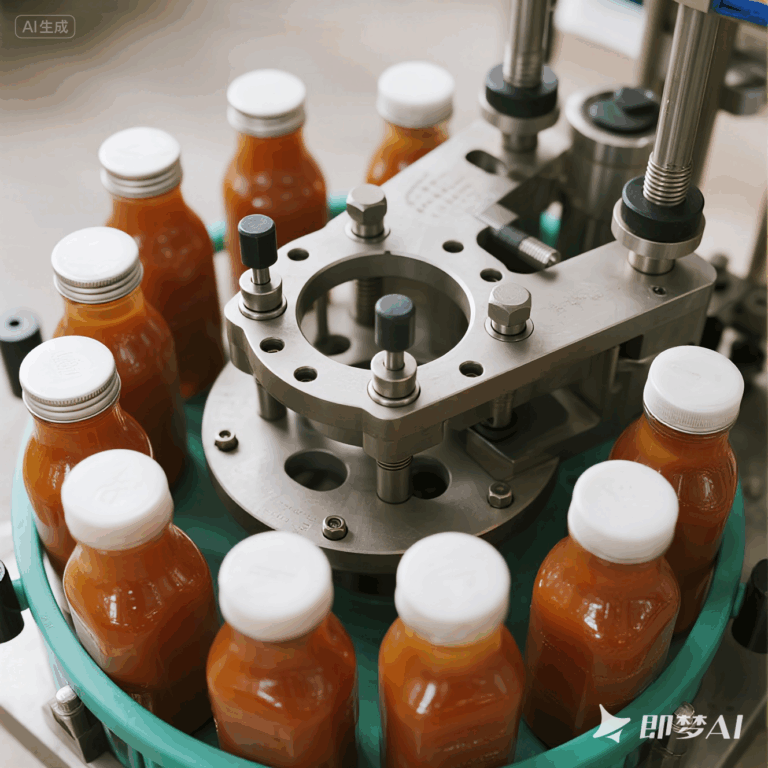Maximizing Energy Efficiency with Solar Power Hybrid Inverter: A Practical Guide to Performance and Reliability
Home » Maximizing Energy Efficiency with Solar Power Hybrid Inverter: A Practical Guide to Performance and Reliability
RECENT POSTS
Share:
- November 2, 2024
Table of Contents
Solar power hybrid inverters are essential for modern energy systems. It enables the efficient use of solar power while providing reliable energy storage options. They allow homeowners and businesses to use solar energy efficiently while providing backup power when needed.
By converting direct current (DC) from solar panels into alternating current (AC), hybrid inverters can power everyday appliances. They also store excess energy in batteries for use during cloudy days or power outages.
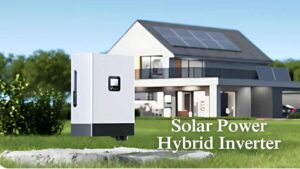
What is a Solar Power Hybrid Inverter?
A solar power hybrid inverter is a device that combines the functions of a solar inverter with a battery inverter, allowing for the seamless integration of solar panels, energy storage, and the electrical grid.
Moreover, hybrid inverters manage multiple power sources including stored battery and solar energy to ensure efficient energy sources. It can also be maximizing resources efficiently and energy can be generated, stored, or consumed as needed.
On the other hand, hybrid inverters are adaptable and suitable for various energy demands including residential, industrial, and commercial settings.
How Does a Solar Power Hybrid Inverter Work?
A hybrid inverter works by converting solar energy into electricity for your home or work. The inverter takes the direct current generated by solar panels and converts it into alternating current. Then, the inverter supplies the electricity to your home.
It can also take AC power from the grid and turn it back into DC for charging batteries. This means that when there isn’t enough sunlight, or if there’s a power outage, the inverter can switch to using battery power. This makes sure you always have electricity when you need it.
Key Features of Modern Solar Power Hybrid Inverters:
Nowadays, these inverters hold advanced features which is help to designed to optimize solar energy use and enhance system stability.
- Multi-Channel MPPT Design: Many hybrid inverters use multi-point power tracking (MPPT) technology. It helps to adjust the different sunlight angles and optimizes power output from multiple solar panels.
- Lithium Battery Activation: These batteries offer higher energy density, great charging, and longer life. The activation function built into these inverters maintains battery safety and stability.
- Remote Monitoring: A cloud-based or WiFi-enabled monitoring platform allows users to access real-time information about their inverter. No matter whether you are at home or work, you can monitor battery health, system performance, and energy flow.
- Noise and Heat Management: A natural cooling system helps to reduce the noise. On the other hand, the heat management function ensures long and lasting components and reliable operations.
- 20ms Automatic Switching: Solar Power Hybrid inverter offers near-instantaneous switching, with a 20ms (millisecond) response time. This feature ensures continuous power by switching between power sources seamlessly.
- Dual Battery Input: The dual-battery option can help users manage high energy demands while enhancing the inverter’s resilience during peak usage periods.
Advantages of Solar Power Hybrid Inverters
These advanced hybrid inverters offer a lot of advantages for their users. Let’s discuss some of these advantages with their details.
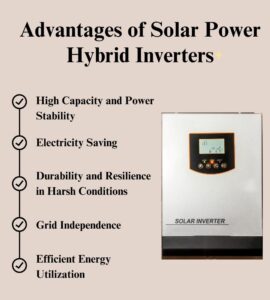
1. High Capacity and Power Stability:
These inverters come with programmable generator ports for enhanced control and UPS-grade on/off-grid switching to provide stable and reliable energy output.
2. Electricity Saving:
Solar Power Hybrid inverter can store the excess solar energy rather than wasting it. Users can use the stored energy during the peak electricity pricing period which will help to save on utility bills. It is possible to store the excess solar energy rather than wasting it with the help of these hybrid inverters.
3. Durability and Resilience in Harsh Conditions
These inverters are built with robust materials and are often IP65 certified. This material protects them from dust, water, and harsh outdoor conditions. Moreover, it also ensures long-term reliability in different environments.
4. Grid Independence:
During power outages, these systems can switch seamlessly to battery power within milliseconds. It can also ensure a continuous power supply for essential devices. This function is great for those locations or in areas with high electricity demand.
5. Efficient Energy Utilization
These hybrid inverters ensure that the energy generated is used effectively. Furthermore, it also manages multiple sources like solar, grid, and battery. In that case, if the solar energy is huge, you can use it directly or store it in the battery for later use.
Types of Battery Storage Systems Compatible with Hybrid Inverters:
Here are some of the common types of the battery which are used for storage purposes.
- Lithium-Ion Batteries
- Lead-Acid Batteries
- Flow Batteries
Key Considerations When Choosing a Hybrid Inverter
Selecting the right Solar Power hybrid inverter will help you meet your specific needs. Here are some of the factors that you need to know.
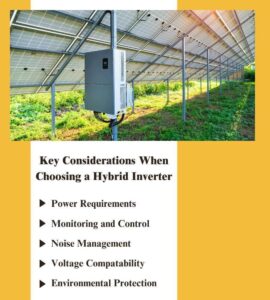
- Power Requirements: Choose a model with greater power capacity that will help you with higher energy needs.
- Monitoring and Control: Make sure the inverter offers remote monitoring capabilities. This will help to inform about the updates on the system or manage the multiple installations.
- Noise Management: Ensure that the inverter holds a low-noise or natural cooling feature. This will make the inverter an ideal choice for homes.
- Voltage Compatability: Different inverter models provide low or high-voltage systems. Make sure that the model you purchase matches the installation voltage requirements.
- Environmental Protection: Industrial and outdoor installations can benefit from a higher protection rating such as dust, temperature fluctuations, and moisture. This can increase the hybrid inverter’s lifespan in these challenging environments.
Can Hybrid Solar Inverters work without a battery?
Yes, the Solar Power Hybrid Inverter can work without a battery. They can directly convert solar energy into electricity and supply it to your home or business. However, one thing you need to know is that you cannot save extra energy for later use without batteries.
It means your solar panels make more energy power in the daytime. Then, the extra energy won’t be stored for nighttime or cloudy days. So, if the sun is not shining, then, you’ll have to rely on grid power. This setup is good as well but it missed out on the benefits of saving solar energy.
FAQs:
Q. What does a hybrid solar inverter do?
A hybrid solar inverter converts solar energy into electricity for your home. It can also store the excess energy in batteries for later use. Moreover, it can also connect to the grid and switch between solar and grid power automatically.
Q. What are the disadvantages of a hybrid solar inverter?
Hybrid solar inverters also have some disadvantages. These include higher cost, Battery dependence, Energy loss, limited lifespan, and complex installation.
0

